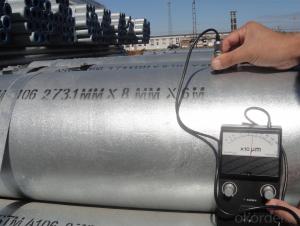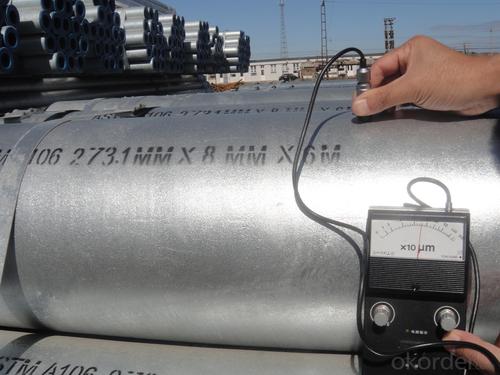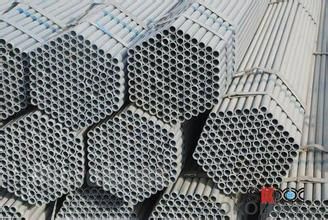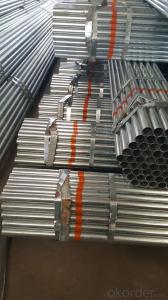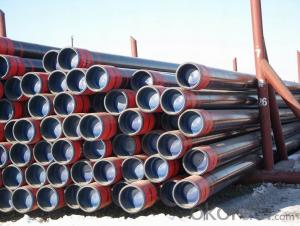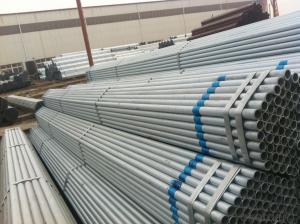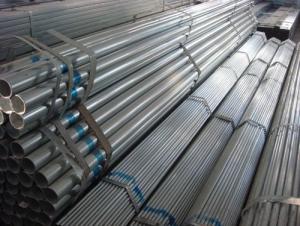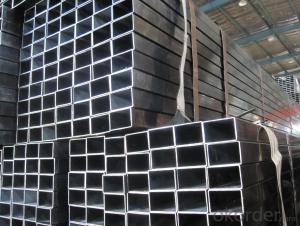Galvanized Hot Rolled Steel Pipe 1-4“
- Loading Port:
- China Main Port
- Payment Terms:
- TT or LC
- Min Order Qty:
- -
- Supply Capability:
- -
OKorder Service Pledge
OKorder Financial Service
You Might Also Like
Specifications
Galvanized Pipe / Black Pipe / ERW Steel Pipe
Out Diameter: 10.3mm - 406.4mm
Thickness: 0.6mm 20.0mm
Steel Grade: Q195-Q345, S235JR, S275JR, S355JR, Gr. B-D
Standard: GB/T 3091-2001, BS1387-1985, DIN EN10025, EN10219, ASTM SCH40, ASTM SCH80
Surface Finish: hot dipped galvanized, electro galvanized, black
Out Diameter | Wall Thickness | Length | |
Inch | mm | mm | meter |
1/2 | 21.3mm | 0.6mm-3.0mm | 0.3m-12m |
3/4 | 26.9mm | 0.6mm-3.0mm | 0.3m-12m |
1 | 33.4mm | 1.0mm-3.0mm | 0.3m-12m |
1-1/4 | 42.3mm | 1.0mm-4.0mm | 0.3m-12m |
1-1/2 | 48.3mm | 1.0mm-4.0mm | 0.3m-12m |
2 | 60.3mm | 1.5mm-4.0mm | 0.3m-12m |
2-1/2 | 76.1mm | 1.5mm-4.0mm | 0.3m-12m |
3 | 88.9mm | 1.5mm-9.5mm | 0.3m-12m |
4 | 114.3mm | 2.0mm-9.5mm | 0.3m-12m |
5 | 141.3mm | 3.0mm-9.5mm | 0.3m-12m |
6 | 168.3mm | 3.0mm-12.0mm | 1.0m-12.0m |
8 | 219.1mm | 3.2mm-12.0mm | 1.0m-12.0m |
10 | 273mm | 3.2mm-12.0mm | 1.0m-12.0m |
12 | 323.8mm | 6.0mm-15.0mm | 1.0m-12.0m |
14 | 355.6mm | 8.0mm-15.0mm | 1.0m-12.0m |
16 | 406.4mm | 8.0mm-20.0mm | 1.0m-12.0m |
Note: Pre-galvanized round hollow section with OD 19mm-100mm and thickness 1mm-2.3mm are also available.
FAQ of Galvanized Hot Rolled Steel Pipe:
①How is the quality of your products?
Our products are manufactured strictly according to national and internaional standard, and we take a test on every pipe before delivered out. If you want see our quality certifications and all kinds of testing report, please just ask us for it.
Guaranteed: If products’ quality don’t accord to discription as we give or the promise before you place order, we promise 100% refund.
②How about price?
Yes, we are factory and be able to give you lowest price below market one, and we have a policy that “ for saving time and absolutely honest business attitude, we quote as lowest as possible for any customer, and discount can be given according to quantity”,if you like bargain and factory price is not low enough as you think, just don’t waste your time.Please trust the quotation we would give you, it is professional one.
③Why should you chose us?
Chose happens because of quality, then price, We can give you both.Additionally, we can also offer professional products inquiry, products knowledge train(for agents), smooth goods delivery, exellent customer solution proposals.Our service formula: good quality+good price+good service=customer’s trust
SGS test is available, customer inspection before shipping is welcome, third party inspection is no problem.
Galvanized Hot Rolled Steel Pipe Images:
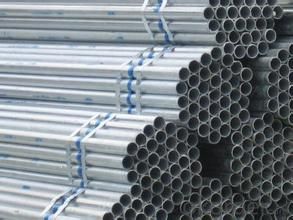
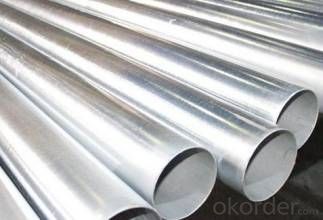
- Q: Can steel pipes be recycled?
- Yes, steel pipes can be recycled. Steel is one of the most commonly recycled materials in the world, and steel pipes can be melted down and reused to make new steel products. Recycling steel pipes helps conserve natural resources and reduces the environmental impact of manufacturing new steel.
- Q: What are the different types of steel pipe connections for oil and gas pipelines?
- There are several types of steel pipe connections used for oil and gas pipelines, including threaded connections, welded connections, flanged connections, and grooved connections. Threaded connections involve screwing two pipe ends together using threads, providing a secure and leak-proof joint. Welded connections involve fusing pipe ends together using heat, creating a strong and durable joint. Flanged connections use a flange on each pipe end that is bolted together, providing a sturdy and easily removable joint. Grooved connections involve utilizing a groove on each pipe end, which is then locked together using a coupling, ensuring a reliable and flexible joint.
- Q: What are the different methods of joining steel pipes?
- There are several different methods of joining steel pipes, including welding, threading, flanging, grooving, and using mechanical connectors.
- Q: Can steel pipes be used for wastewater treatment systems?
- Yes, steel pipes can be used for wastewater treatment systems. Steel pipes are commonly used in wastewater treatment systems due to their durability, corrosion resistance, and ability to withstand high pressures and temperatures. Additionally, steel pipes can be easily welded and have a long lifespan, making them a suitable choice for transporting and distributing wastewater within treatment facilities.
- Q: Can steel pipes be recycled and used for other purposes?
- Yes, steel pipes can be recycled and used for other purposes. Steel is a highly recyclable material, and steel pipes are no exception. Recycling steel pipes helps to conserve natural resources and reduce the demand for new steel production. When steel pipes are recycled, they are typically sent to a recycling facility where they are sorted, cleaned, and processed. The pipes are then crushed into smaller pieces or melted down to be reshaped into new steel products. Recycled steel pipes can be used for a variety of purposes. They can be used in construction projects, such as for building bridges, roads, or buildings. They can also be used in the manufacturing of new steel products, such as automotive parts, appliances, or furniture. Additionally, recycled steel pipes can be used in the energy sector, for example, in the production of wind turbines or oil and gas pipelines. Using recycled steel pipes not only helps to reduce waste and conserve resources but also has environmental benefits. The recycling process requires less energy and produces fewer greenhouse gas emissions compared to the production of new steel. Therefore, recycling steel pipes is a sustainable option that contributes to a circular economy and helps to protect the environment.
- Q: What are the limitations of using steel pipes?
- Using steel pipes in various applications has several limitations. Firstly, the cost of steel pipes compared to materials like plastic or copper can be quite high. This can be a significant drawback for projects with limited budgets. Secondly, steel pipes are susceptible to corrosion. Exposure to moisture and certain chemicals over time can cause rust and deterioration. This can lead to leaks, reduced structural integrity, and the need for expensive repairs or replacement. Another limitation is the weight and rigidity of steel pipes. They are generally heavier and less flexible than other types of pipes, making installation and maneuvering more challenging in certain settings. Additionally, their rigid nature makes them less suitable for applications requiring movement or flexibility. Furthermore, steel pipes can experience thermal expansion and contraction. Extreme temperatures can cause them to expand or contract, potentially stressing joints, fittings, or other components. This can lead to leaks or even pipe failure if not properly addressed. Lastly, steel pipes are not as resistant to certain chemicals or substances as other materials. Some chemicals can corrode or erode the inner lining, compromising integrity and potentially causing contamination or leakage. While steel pipes have advantages, it is important to consider these limitations when selecting the most suitable material for a specific application.
- Q: Can seamless steel pipe and ordinary steel pipe be welded?
- If your project is a seamless steel pipe, so theoretically, you put the tube with connected is not used.But the actual engineering operation, design drawings will be put on the normal need to improve the requirements of the drawings to the actual requirements, so if is the need of seamless steel pipe, welded pipe in the end so can you see yourself.
- Q: What is the difference between steel pipes and fiberglass pipes?
- Steel pipes and fiberglass pipes differ in their material composition and properties. Steel pipes are made of iron and carbon alloy, making them strong and durable. They are suitable for high-pressure applications and can withstand extreme temperatures. In contrast, fiberglass pipes are composed of glass fibers embedded in a resin matrix. They are lightweight, corrosion-resistant, and have excellent thermal insulation properties. Fiberglass pipes are commonly used in industries where corrosion or chemical resistance is required, and they are also more cost-effective for certain applications.
- Q: What is the difference between schedule 10 and schedule 40 steel pipes?
- Schedule 10 and schedule 40 steel pipes are both commonly used in various industries for different purposes. The main difference lies in their wall thickness and pressure ratings. Schedule 10 steel pipes have a thinner wall compared to schedule 40 pipes. This means that schedule 10 pipes have a smaller internal diameter and can handle less pressure compared to schedule 40 pipes. The wall thickness of schedule 10 pipes is typically 0.109 inches, while schedule 40 pipes have a wall thickness of 0.154 inches. Due to their thinner walls, schedule 10 pipes are primarily used for low-pressure applications such as domestic water supply, drainage systems, and general plumbing. They are also commonly used for lightweight structures or where weight is a concern. On the other hand, schedule 40 pipes are designed to handle higher pressure and are often used in industrial applications, including oil and gas pipelines, chemical processing plants, and high-pressure fluid systems. The thicker walls of schedule 40 pipes provide them with increased strength and durability to withstand higher pressure and stress. In summary, the main difference between schedule 10 and schedule 40 steel pipes is their wall thickness and pressure ratings. Schedule 10 pipes have a thinner wall and are suitable for low-pressure applications, while schedule 40 pipes have a thicker wall and can handle higher pressure. It is important to choose the appropriate schedule based on the specific requirements and pressure limitations of the intended application.
- Q: Are steel pipes suitable for transporting chemicals?
- Yes, steel pipes are suitable for transporting chemicals. Steel pipes have excellent strength and durability, making them capable of handling various corrosive chemicals and maintaining their structural integrity. Additionally, steel pipes can withstand high pressure and temperature, making them a reliable choice for chemical transportation.
Send your message to us
Galvanized Hot Rolled Steel Pipe 1-4“
- Loading Port:
- China Main Port
- Payment Terms:
- TT or LC
- Min Order Qty:
- -
- Supply Capability:
- -
OKorder Service Pledge
OKorder Financial Service
Similar products
Hot products
Hot Searches
Related keywords
